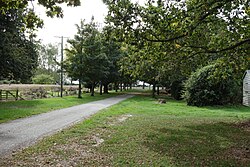Barrhill | |
|---|---|
Village | |
 View along Sycamore Avenue in Barrhill | |
| Coordinates: 43°40′22.8″S 171°51′10.8″E / 43.673000°S 171.853000°E | |
| Country | New Zealand |
| Region | Canterbury |
| Territorial authority | Ashburton District |
| Founded | 1876 |
| Founded by | Cathcart Wason |
| Named for | Barrhill, South Ayrshire |
| Area | |
| • Total | 36 km2 (14 sq mi) |
| • Land | 31 km2 (12 sq mi) |
| • Water | 5 km2 (2 sq mi) |
| Elevation | 210 m (690 ft) |
| Population (2013 census) meshblock 2750400 | |
| • Total | 66 |
| • Density | 1.8/km2 (4.7/sq mi) |
| Local iwi | Ngāi Tahu |
Barrhill is a lightly populated locality in the Canterbury region of New Zealand's South Island. It is situated on the Canterbury Plains, on the right bank of the Rakaia River, about 17 kilometres (11 mi) inland from Rakaia. It was founded by Cathcart Wason in the mid-1870s and named by him after his old home Barrhill in South Ayrshire, Scotland. Wason set it up as a model village for the workers of his large sheep farm. The population of the village peaked in the mid-1880s before the general recession initiated a downturn for the village. Wason had expected for the Methven Branch railway to run past Barrhill, but the line was built in 1880 on an alignment many miles away, which caused Barrhill population to decrease.
Three of the original buildings of Barrhill plus the gatehouse at Wason's homestead were constructed of concrete, and they still exist to this day. One of those buildings, St John's Church, is registered by Heritage New Zealand as a Category II heritage building, and the gatehouse is a museum that is open on request. Today, few buildings exist in the village, but the formal layout of avenues still exists, giving the setting a charming appearance.
